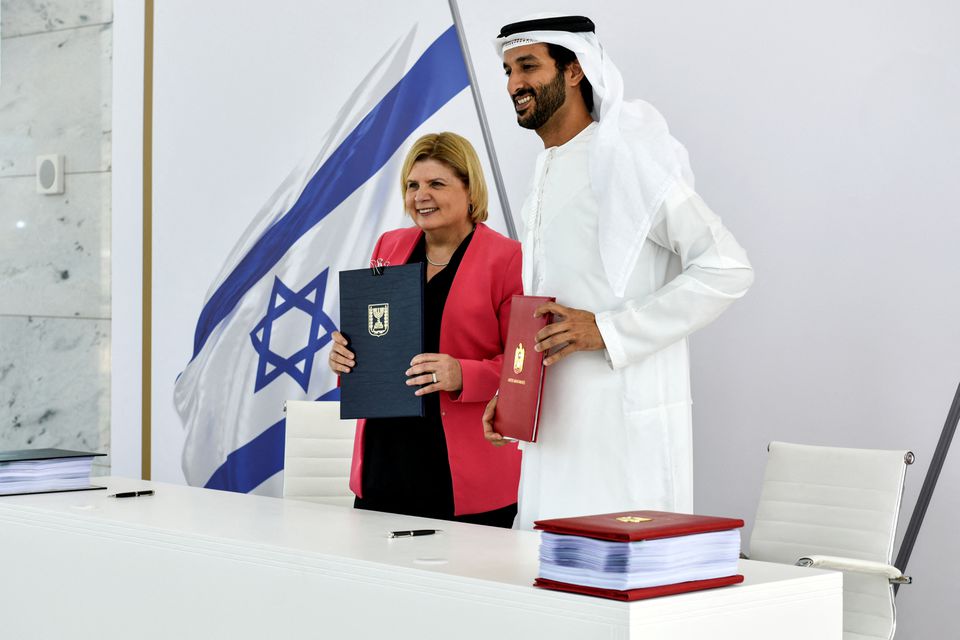Alwaght- Amid the growing Israeli-Palestinian tensions that draw waves of international aversion to the the Israeli suppressive actions, the UAE signed a free trade agreement with the Israeli regime on Wednesday. The pact follows months of negotiations between the Israeli Minister of Economy and Industry Orna Barbivai and her Emirati counterpart Abdulla bin Touq Al Marri in Dubai. According to the deal, the tariff for 96 percent of the goods between the two sides would be removed. Officials on both sides stressed that the signing of such an agreement could pave the way for significant trade, industrial, commercial, and technical exchange increase to more than $10 billion over the next five years.
The Israeli officials refer to it as a "historic" pact to indicate a high degree of satisfaction for a trade deal with a Muslim country. In a tweet, Israeli Prime Minister Naftali Bennett praised Abu Dhabi President Mohammed bin Zayed and described the process as the fastest to sign in the Israeli history. This agreement is the first free trade pact of the Israeli regime with a Muslim and Arab country. The Israelis are now optimistic that its signing will be a prelude to striking similar deals with other Arab countries.
On the other hand, the UAE authorities and media seek to glorify the deal with the Israelis and use it as a symbol to encourage other Muslim countries to join the normalization process.
"Signing of the agreement opened a new chapter in the history of the Middle East," wrote Emirati Commerce Minister Thani al-Zeyoudi in a Twitter post.
This is the second Emirati free trade agreement after a similar one with India in February this year, and the country, after the Israeli regime, plans pacts with several other countries, including Indonesia and South Korea. Abu Dhabi is trying to paint the free trade agreements with the Tel Aviv and other countries as a means reversing the negative consequences of the coronavirus pandemic on the country's economy.
Bin Salman's empty hands from normalization and clinging to economic achievements
In examining the large-scale propaganda surrounding the free trade pact, the most important factor that should be considered is the failure of UAE strategic goals behind normalization with the Israeli regime. It is safe to say that the only tangible achievements of the normalization agreement for the UAE over the past year and a half have been the insignificant increase in trade and the sending of several students to study at Reichman University in the occupied territories. Contrary to Mohammed bin Zayed's assumptions, not only being a normalization forerunner did not win Abu Dhabi great European and American privileges but also bin Zayed's is seeing his closeness to Washington narrowing down under President Joe Biden.
Immediately after the signing of normalization agreement, dubbed Abraham Accords, in September 2020, the time's US President Donald Trump signed a $23 billion arms deal with bin Zayed. The deal, which included the sale of 50 F-35 Lighting II fighter jets and other defense systems to the UAE, gave bin Zayed hope that the purchase of advanced fifth-generation fighter jets would be a major achievement. Contrary to his expectations, the Israeli regime became the first opponent of the delivery of the stealth jets to the Arab monarchy from the very beginning of the agreement, on the pretext that the implementation of such an agreement would suspend the implementation of the West Bank annexation plan.
But under Biden, the White House suspended the jets deal as Biden showed unwillingness to deepening of ties with Abu Dhabi driven by pro-rights promises in his election campaigns.
On the other hand, bin Zayed and other Emirati officials in the face of a wave of widespread opposition in the Muslim world claimed that the so-called peace deal was in the interests of the Palestinians and halt of settlement projects was one of its achievements. But contrary to Abu Dhabi's promises, in the year and a half since the signing of the normalization agreement, not only have settlements not stopped but also they have expanded significantly.
In such circumstances, bin Zayed, who sees his expectations from the normalization unrealized, is trying to paint the free trade with Tel Aviv as a breakthrough to save his face. He struggles to suggest that the promise breaking by the Israelis regarding Palestine and continuing the illegal settlement construction are insignificant and can be buried by the economic cooperation.
It is noteworthy, however, that despite increase in the Israeli-Emirati trade exchange several folds since 2020, their trade has not even reached $1 billion yet. According to Israeli sources, it was €814 million ($874 million) in 2021, and such a small amount does not fit the glamorous propaganda the Emirates is staging about the free trade agreement.



























